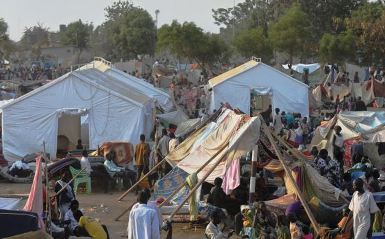Overcrowding at Juba camps for displaced sparks fears of HIV outbreak
September 2, 2014 (JUBA) – Overcrowding in camps for internally displaced people (IDPs) in South Sudan’s capital, Juba, is exposing young people sheltering at the sites to the risk of HIV/AIDs.

Residents say a lack of awareness could see the disease spread among young people, with camps lacking voluntary counselling and testing services.
All three protection sites near the UN House in Juba’s Jebel area are at risk of a further HIV/AIDs outbreak.
The Jebel camps are among the most congested sites in South Sudan.
However, despite the congested conditions many people prefer to remain at the camps due to fear of returning to their homes in town.
Health worker Jal Chuol said more deaths are likely to occur if early warning signs are ignored.
He said seven people diagnosed with HIV remained at the camp and were currently receiving drugs.
He told Sudan Tribune that young people in particular are at high risk of contracting HIV/AIDs, with more than 10 cases of rape reported to the camps’ health facility.
“This time it is mostly likely youths that are having HIV positives, although there are some elders people that may [be] having, but most of the time it is youths, especially young girls and women, who are found raped,” said Chuol.
He said high incidences of rape last year were also behind a spike in HIV positive cases.
Camp resident Nyajime Gatdiet said she feared the spread of HIV as a result of the congested conditions UN camp in Jebel.
“It is very easy to get the HIV [virus] since the camp is congested. The door posts are close to each other, you can find different family [members] like ladies or girls staying together while near the men,” said Gatdiet.
She says traditional concepts of sharing razors and knives may also increase the spread of deadly diseases.
“Since we are congested another one may use that razor blade and then by mistake she or he has forgotten it somewhere close to you come there by mistake and may be that person also have that disease you wouldn’t know,” she said
Chuol and other midwives run the Jebel camps that house nearly 20,000 displaced people.
He said it is often difficult to talk to rape victims, as many are deeply traumatised by the violent nature of the attack.
“They don’t want other people to know themselves so they will give you condition, ‘if you tell my name to others I will kill myself’. Most of the times I will call for help from the doctor or my fellow colleagues, the other midwife; they will give me advice and then I have to give only some painkiller for prevention of pregnancy,” said Chuol.
The main challenges facing health workers remain a lack of awareness about the dangers of HIV/AIDs and other sexually transmitted diseases, he added.
Some 1.5 million people have been displaced since conflict broke out in South Sudan in mid-December last year after a political dispute within the country’s ruling party (SPLM) turned violent, with tens of thousands seeking refuge at UN sites across the country.
(ST)
